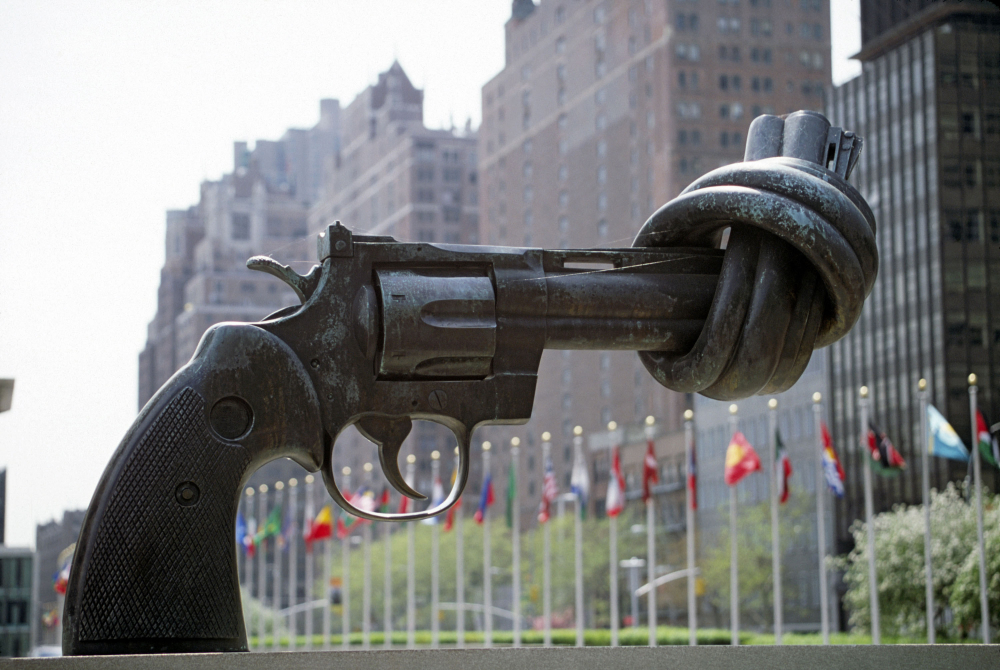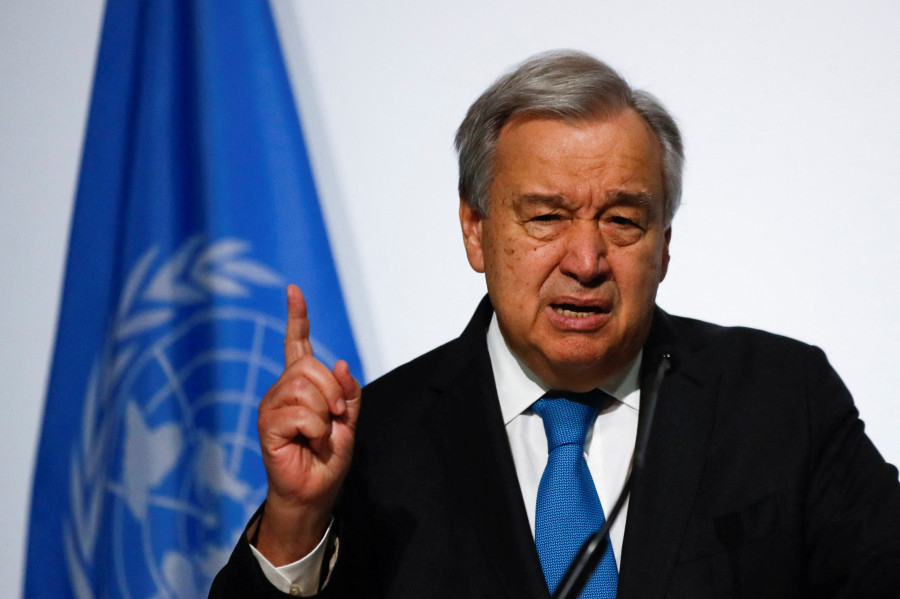The United Nations on the Test of Existence

We use Google Cloud Translation Services. Google requires we provide the following disclaimer relating to use of this service:
This service may contain translations powered by Google. Google disclaims all warranties related to the translations, expressed or implied, including any warranties of accuracy, reliability, and any implied warranties of merchantability, fitness for a particular purpose, and noninfringement.

Highlights
- It has been 79 years since the United Nations was established with the responsibility of bringing peace and order to the world against war and terrorism. But due to the growing geopolitical competition between the new and old power nations and their own juggling between those nations, the role of the United Nations is now being questioned.



Russia-Ukraine and Israel-Palestine war are now becoming the biggest conflicts in the world. On the other hand, problems such as hunger, refugee problems, health, education, and violence are becoming more and more serious. Moreover, the effects of climate change are increasing all over the world and it is directly and indirectly affecting the fauna of the earth.

On the other hand, although the 17 Sustainable Development Goals (SDGs) advanced by the United Nations are said to be completed by 2030, there is no possibility of that after half the time has passed. In recent times, it seems that the right-wing and 'populist' groups have created more problems in the world. They are spreading misinformation and disinformation through various means causing accidents. Due to Covid-19, the world came to a standstill for almost a year, which created a new culture of working virtually. But at that time poverty increased due to the impact on the economic sector.
The United Nations (UN) is the body responsible for maintaining peace and security in the world. However, recently peace and security is becoming an urgent problem around the world. Considering this background, UN Secretary General Antonio Guterres has taken new steps to reactivate the role of the United Nations as a hub of multilateral diplomacy.
During the 79th General Assembly, Secretary General Guterres is going to hold a 'Summit of the Future' program in New York. The program is being held for the first time on October 6 and 7. The co-hosts are Germany and Namibia.

The initiative of 75-year-old Guterres, who is also the former Prime Minister of Portugal, has now become a matter of interest as to how much it will revive the UN. Secretary-General Guterres is promoting five key objectives and agreements at the 'Summit of the Future' to revitalize the UN and its activities. These include recommitting to the UN Charter, reviving multilateralism, emphasizing the implementation of existing commitments, agreeing to new challenges and restoring trust. Diplomat Dinesh Bhattarai, a geopolitical expert, believes that the challenge for the United Nations has increased when the powerful nations bypass the UN and work in their own way. Power nations do not follow the UN Charter. Only countries like us are following it,' he commented, 'I think the Secretary General is trying to re-commit everyone, including the powerful nations, to reduce the growing crisis in the world.' .
• • •
First, it is important to understand how the UN was born and how it came to be where it is today. World War I lasted from 1914 to 1918. In 1920, some countries founded the League of Nations in order to prevent the devastation caused by the four-year world war and to prevent similar wars in the future. Nepal also became a member of the organization. But the League of Nations failed to avert the Second World War. World War II lasted for 6 years from 1939.

With the outbreak of the Second World War, the role of the 'League of Nations' also ended. Soon after, the UN was established on October 24, 1945.
The UN is a common organization among the sovereign nations of the world. On January 1, 1942, the 26 member nations of the warring bloc against Germany, Italy, and Japan announced the concept of the United Nations. In June 1945, 51 countries signed the UN Charter at a meeting in San Francisco, USA. The Charter consists of 19 chapters and 111 articles. The principle of the UN is to maintain international peace. The six main organs of the UN are the General Assembly, the Security Council, the Economic and Social Council, the Trusteeship, the International Court of Justice and the Secretariat. The most important organ of the UN is the Security Council. It has 5 permanent member countries. The United States, China (first Taiwan and later a communist country), the Soviet Union (currently Russia), Britain and France became members of the Security Council, which still remains.
India, Brazil, South Africa and other African countries are now raising the voice that the UN and the Security Council should be restructured. But it was not successful. Why is the role of the 5 countries of the Security Council so important because those countries can use the right of 'veto power'. As a result, those countries have been more powerful and effective than others in the UN.
It has been 79 years since the UN was established with the responsibility of bringing peace and order to the world against the wars and terrorism going on in different corners of the world. However, now due to the growing geopolitical competition between the old and new powers and when the powers are fighting each other, the role of the institution has been questioned. Another important organ of the UN is the Secretariat, which is headed by the Secretary-General. Its headquarters are in New York. The Secretary-General is appointed by the General Assembly on the recommendation of the Security Council. In its long history, the UN has recently promoted the UN Women, UN Youth, Counter-Terrorism Office, Department of Field Support to name a few. Which seems to be trying to make the organization more effective for working on other issues. However, the effectiveness of the UN has been questioned due to the Security Council as an important organ and other main peace and security activities.
Although the UN has been continuously trying to promote peace, security and conflict reduction, it has not been successful. Recently, the increasing multipolarization in world politics has now started to be combined with multilateral, regional and strategic cooperation. But the UN has succeeded neither in eliminating poverty nor conflict in the world. Although the UN has brought various programs including the goal of sustainable development, moving from least developed countries to developing countries, the people have not been able to realize it.
Another geopolitical expert, Rupak Sapkota, also believes that the UN is relaxing recently. "To reduce the weakness of the UN and contribute to the world and the human community by solving the problems, the summit is going to be held under the leadership of Secretary General Guterres," he said He said that America, which is leading the current world order, and its partner countries, along with other 'Global South' countries, especially India, African continent and Latin American countries, are taking initiatives to become members of the Security Council. He clarified that since the UN is a common country of all, it should be restructured in time.
• • •
Secretary-General Guterres has started a campaign by bringing the 'Summit of the Future' program on his own initiative and calling the heads of state or governments around the world to make a commitment to solve all the world's problems. At the same time, the Prime Minister of Nepal is also being invited. The Ministry of Foreign Affairs has already started homework for Prime Minister KP Sharma Oli to participate in the program.
The 'Summit of the Future' has been described as an important gathering of world leaders to unite to redefine the path of the future while safeguarding the challenges of the present situation. The conference, which is going to be held by the UN for the first time, has been mentioned as a high-level event. Where world leaders are brought together to help create a new international consensus on how to improve the current situation and how to secure the future. It is mentioned that the
conference will work to repair and improve the trust of the current generation and show that international cooperation can effectively deal with the challenges that have emerged in recent years. In the words of Secretary General Guterres, the world is currently in the most critical situation since the Second World War. Guterres is saying that there is a weakness in multilateralism and the problem of climate change is increasing day by day. There are two major wars going on in the world, Russia-Ukraine and Israel-Palestine, and internal and external conflicts are going on in many places.

Secretary-General Guterres released 'Our Common Agenda' report to address peace and security issues. In which he proposed a summit to set a 'new agenda for peace' with more investment for peace building, support for regional conflict prevention. The Secretary-General promoted this dialogue as a peaceful and sustainable solution to reduce strategic risks such as nuclear weapons and cyber warfare. Guterres described the conference as an opportunity to "reinvigorate global action, recommit to basic principles and further develop the framework of multilateralism."
'I propose a Summit of the Future conference to build a new global consensus on what our future should be and what we can do today to secure it. "Humanity has shown time and time again that we are capable of achieving great things when we work together," said Secretary-General Guterres. . Now is the time to take new steps for the entire human community in our united journey. According to the UN, the conference aims to intensify the efforts of member countries to fulfill their current international commitments and take concrete steps to respond to emerging challenges and opportunities. It is said that all the member countries will proceed with the agreement. The countries leading the conference are scheduled to negotiate and support the agreement reached in the discussion and dialogue.
Poverty and hunger have increased in the world. Global emissions are at record highs. According to the UN, threats such as climate, conflict, food security, weapons of mass destruction, epidemics and health crises and risks related to new technologies are on the rise. Building on established frameworks such as the UN Charter, the Universal Declaration of Human Rights (UPR), the Sustainable Development Goals (SDGs) 2030 Agenda, the Paris Agreement on Climate Change and the Addis Ababa Action Agenda for the Implementation of the SDGs, the 'Summit of the Future' conference will provide practical strategies to achieve our shared aspirations. The UN says to seek.
The program also recommended a similar renewal of the multilateral system. The UN has claimed that the conference will create conditions that can more easily achieve the implementation of the 2030 Agenda for Sustainable Development.
It is said that it will improve international cooperation and enable everyone to solve problems. Arun Subedi, a geopolitical expert, believes that the UN cannot proceed effectively without restructuring.
He also emphasizes the need for changes in the permanent members of the Security Council. The permanent members of the Security Council have not been able to represent members proportionally to the military strength and population. For example, it seems that countries including India, Nigeria, Indonesia, and Brazil should be permanent members of the Security Council, he said. Subedi claims that the current situation cannot be improved until the UN resolves the structural problems.
There is a history of UN Secretary Generals not being able to work because of the 'bullying' of the Security Council. The current Secretary General Guterres is also in the middle of the power struggle between the same power nations. At the UN, even if the Secretary-General wishes, not much may happen. Although the Secretary General is appointed by the General Assembly, his recommendation is made by the same Security Council. Although all the work of the UN is led by the Secretary General, the approval of the important work must be taken from the Security Council. As a result, the role of the Secretary General remains only as a constitutional role. It is because of the bullying of the Security Council that Secretary General Guterres has not stopped despite his continuous efforts. However, in order to make the UN more effective through his role, Secretary General Guterres has brought 'Future of the Summit' as a new program. The purpose of which is to revive the UN again after 79 years.
 प्रकाशित : भाद्र १, २०८१ ०८:४३
प्रकाशित : भाद्र १, २०८१ ०८:४३

 २३.१२°C काठमाडौं
२३.१२°C काठमाडौं











